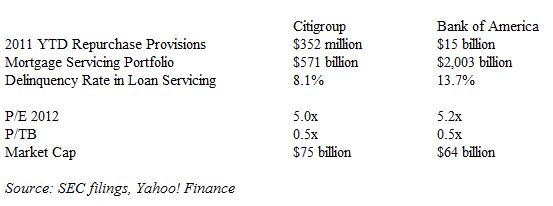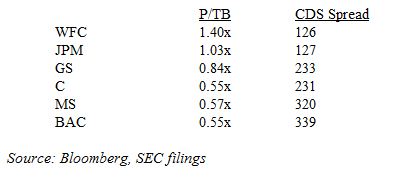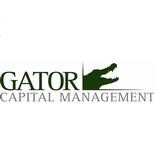 Author: Derek Pilecki, Gator Capital Management
Author: Derek Pilecki, Gator Capital Management
Covestor models: Long-Only Energy, Large Cap and Small Cap
Disclosure: Long C, BAC, MS and WFC
Bank of America has been in the headlines about its mortgage exposure and capital situation. Its stock is down 42% this quarter through September 23rd, but Citigroup, which I do not believe has similar problems, is also down 40%. In fact, the two stocks seem to be perfectly correlated. It appears that investors are making macro trades against the banking sector without doing fundamental research on the individual companies within the sector. I do not know whether investors are just scrambling to hedge exposures using any bank stock they can find or whether they are expressing their views mainly through sector ETFs. However, good stock pickers appear to have an opportunity within the banking sector since the stocks have moved in such close correlation during the quarter.
I have been adding to my Citigroup position at recent levels. It has a tangible book value of $48.75 as of June 30th, but is trading around $25, or at about 50% of tangible book value. It trades at this discount to book value in spite of reporting profits the last six quarters, having improving credit metrics, building capital, an improving its business mix, and potentially beginning a stock repurchase program next spring.
Bank of America trades at a similar 50% of June 30th tangible book value despite what I perceive as having much higher uncertainty about legacy mortgage costs and having recently diluted common shareholders through the preferred stock and warrant sale to Berkshire Hathaway announced in late August.
It seems to me that Citigroup is being unfairly tarnished by Bank of America’s problems and is a better stock to own at the same valuation. An investor could own Citigroup and short Bank of America as a hedged pair trade. I own both stocks, but my position in Citigroup is much larger than my position in Bank of America.
A Classic Turnaround
I believe Citigroup has all the ingredients of a classic turnaround situation. A large conglomerate with an iconic brand performs poorly because it has become too unwieldy to manage. A new CEO comes in and implements a new strategy to exit non-core assets and businesses. The capital generated from the asset sales has been earmarked for share repurchases. The remaining core businesses operate more profitably and grow faster than before because management can now focus resources on these businesses.
Citigroup’s CEO Vikrum Pandit is executing this turnaround. It has been more difficult than normal because of the difficult economic environment, the need for government assistance at the height of the credit crisis, and the massive size of the organization. That being said, it appears from the outside that things are on track. Management has split the company into two segments: one segment (named Citicorp) holds the company’s three core businesses and the other segment (named CitiHoldings) holds various businesses and assets that Citigroup management has decided they no longer want to own. The assets in CitiHoldings have been declining steadily (see slide 13 on Citigroup’s 2nd Quarter Earnings Presentation.) Although I have thought that Citigroup has given up too much value during some of the asset sales, the management has made steady progress with the asset sales.
I project that Citigroup will generate about $15 billion of excess capital over the next two years. I expect the main source of the excess capital will be from the proceeds of asset sales from the wind down of CitiHoldings. Plus, I estimate that Citigroup will generate more capital than required for growth of its core business. The final piece of the turnaround may come by April 2012 when I expect Citigroup will get approval for a stock buyback program with the excess capital it has generated in 2011. Of course, this approval will be dependent on the operating environment and Citigroup’s results and regulators assessment of Citigroup’s capital and risk positions.
After exiting most of the assets in CitiHoldings and hopefully shrinking the outstanding share count substantially, I believe that investors will be attracted to the remaining Citigroup businesses which are currently in the Citicorp segment. These three businesses are the global retail bank, the corporate bank and institutional securities unit, and the transaction processing business. I believe these remaining three businesses are all good franchises and have the ability to produce attractive growth and returns for shareholders. The corporate structure should be much simpler to understand and analyze.
Global Retail Bank
Of the three core businesses within Citigroup, I believe the global consumer banking franchise is the most attractive business and a unique world-class asset. In my opinion, Citigroup has the only global consumer banking brand with possibly only HSBC as a distant #2. This positions Citigroup for better long-term growth prospects than its U.S.-centric peers (BAC, WFC and JPM).
The global nature of the Citigroup’s consumer banking franchise positions it for better loan growth than a typical domestic bank. The retail bank benefits from the fast growing economies of the emerging markets. Plus, Citigroup has the option to redirect resources to or from any particular market based on whether that market’s prospects are attractive. With stronger economies outside the U.S., I believe Citigroup’s consumer banking franchise will generate attractive profits and growth and investors will one day give it a premium valuation compared to its domestic peers like Bank of America.
Comparison to Bank of America
I believe Citigroup should trade at a premium to Bank of America because it doesn’t have the same legacy mortgage and capital issues that I believe have been pressuring Bank of America’s stock in Q3. Here’s a look at some statistics that directly compare the two companies:
I believe that Bank of America’s mortgage issues are an order of magnitude worse than Citigroup’s. Bank of America, including its acquisitions of Countrywide and Merrill Lynch, originated a higher amount of the mortgage loans in the worse vintage years of 2006-2008. Bank of America has realized more mortgage losses so far in 2011 than Citigroup, and it has a mortgage servicing portfolio almost three times the size of Citigroup’s.
Do You Believe the Bond Market or the Stock Market?
The bond market is telling us that Citigroup’s stock is undervalued. Ed Najarian, Head of Bank Research at the ISI Group, wrote an interesting note earlier last week showing the strong relationship between the major banks’ Price-to-Tangible Book ratio compared to where their CDS spreads are trading. Wells Fargo and JP Morgan trade with the tightest spreads and the highest P/TB ratios. At the other end spectrum, Bank of America and Morgan Stanley trade with the widest spreads and the lowest P/TB ratios. In the middle, Goldman Sachs and Citigroup trade with CDS spreads about equivalent to each other. Goldman’s P/TB ratio is perfectly between JPM and WFC on one end and BAC and MS on the other. The interesting part is Citigroup doesn’t have a P/TB close to Goldman’s; rather, it has the same P/TB as Bank of America and Morgan Stanley, which both have wider spread levels. As of 9/20/11:
As a believer that the bond market is collectively smarter than the stock market, I believe the bond market’s assessment of Citigroup’s risk is more accurate, and Citigroup is undervalued by the stock market.Citigroup is a classic turnaround. They are selling non-core assets and I expect the management to use the proceeds to repurchase stock at attractive valuations. I believe the core businesses within Citigroup, especially the global consumer bank, appear attractive and could generate high levels of profitability and growth than their U.S.-centric peers. I believe investors are unfairly penalizing Citigroup for Bank of America’s woes.
Sources
Citigroup
– Company SEC filings
http://www.citigroup.com/citi/fin/sec.htm
– Company Investor Presentations
http://www.citigroup.com/citi/fin/pres.htm
– Yahoo Finance
https://finance.yahoo.com/q/bs?s=C
Bank of America
– Company SEC filings
http://investor.bankofamerica.com/phoenix.zhtml?c=71595&p=irol-sec
– Company Investor Presentations
http://investor.bankofamerica.com/phoenix.zhtml?c=71595&p=irol-presentations
– Yahoo Finance
https://finance.yahoo.com/q/bs?s=BAC





